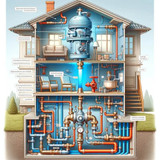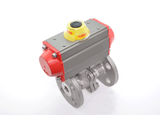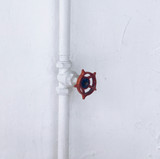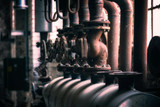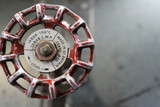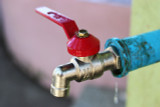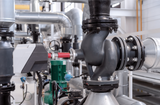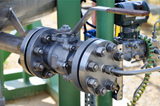True Union Ball Valves
One of the main advantages of true union ball valves is their versatility and malleability. At ValveMan, you’ll find hundreds of such valves from top manufacturers, such as Bonomi. Regardless of the project you’re currently working on, we’re your one-stop shop for all of your valve-related needs!
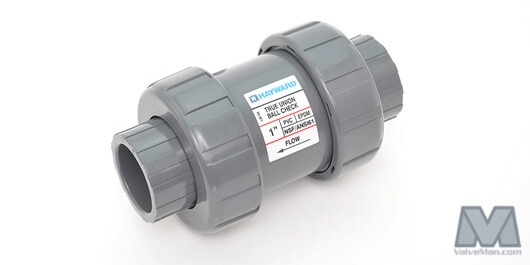
What Is a True Union Ball Valve?
A true union ball valve is a type of valve that consists of a ball valve with a bore through the center, made out of PVC or CPVC. It features a quarter-turn operation mechanism, where the ball is rotated by a handle or a double-acting pneumatic actuator that controls the flow of fluid through the valve. All true union ball valves are made out of plastic, which means that they may not be applicable for all types of manufacturing settings and industrial applications. Keep that in mind when shopping for valves for your project.
The true union design allows for the valve to be taken apart easily for quick installation and maintenance without disassembling the pipeline.
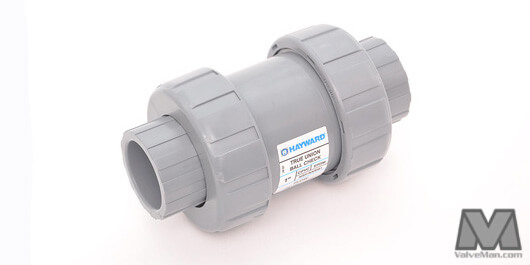
How Do True Union Ball Valves Work?
True union ball valves work based on a simple yet efficient mechanism. When the handle is in the closed position, the ball blocks the flow of fluid entirely. As the handle is turned 90 degrees to the open position, the ball rotates, allowing fluid to flow freely through the valve. This easy-to-use operation makes PVC/CPVC true union ball valves highly practical for both manual and automated control systems.
True Union Ball Valves: Most Common Applications
True union ball valves are widely used in various industries due to their outstanding performance and versatility. As opposed to stainless steel ball valves, for example, these plastic valves may not be the best option for extremely high temperatures or high pressure applications. Some of their most common applications of PVC or CPVC true union ball valves include:
- Water treatment: True union ball valves are frequently utilized in water treatment facilities for regulating water flow and controlling chemical dosing processes.
- Chemical processing: With exceptional resistance to corrosive chemicals, true union ball valves are favored in chemical processing plants for handling aggressive substances with ease.
- HVAC systems: Properly managing coolant flow is vital for HVAC systems to maintain optimal performance. True union ball valves provide reliable handling of fluid flow in these systems, ensuring consistent temperature control.
- Irrigation systems: True union ball valves are essential components in irrigation systems, allowing precise control over water flow to optimize irrigation efficiency.
- Industrial piping: True union ball valves are used extensively in industrial piping systems, facilitating shut-off and flow control in various manufacturing processes.
True Union Ball Valves - Available Materials and Sizes
Depending on the substances you’re handling and the nature of your project, you’re going to need different types of true union ball valves. At ValveMan, we sell true union ball valves made out of CPVC and PVC. They also come in different sizes, including:
- 1/2“
- 3/4“
- 1“
- 1-1/4“
- 1-1/2”
- 2“
What Are the Advantages of PVC and CPVC True Union Ball Valves?
True Union Ball Valves made out of PVC and CPVC offer several advantages that make them a preferred choice for a number of industrial applications:
- Easy installation and maintenance: Unlike other valve types that often require cutting the pipeline, true union ball valves feature a union end connection, allowing for swift and hassle-free installation and maintenance without disrupting the entire system.
- Versatility: True union ball valves are compatible with a wide range of fluids, including liquids, gases, and even slurries. Their ability to handle different media makes them versatile for various applications.
- Leak-proof design: The double O-ring design of true union ball valves ensures a tight seal, minimizing the risk of leakage, making them ideal for critical applications.
- Cost-effectiveness: With their durable construction and minimal maintenance requirements, true union ball valves offer excellent long-term value while keeping operational costs low.
Frequently Asked Questions
Are true union ball valves suitable for high-pressure applications?
No, true union ball valves made out of PVC and CPVC are not meant to handle high-pressure applications. This is because they’re made out of plastic, and can easily be damaged when too much pressure is applied, so they shouldn’t be used as a replacement for dedicated high pressure ball valves.
Do true union ball valves require regular lubrication?
True union ball valves typically do not require regular lubrication due to their self-lubricating properties. However, it is recommended to consult the manufacturer's instructions for specific maintenance guidelines.
Can I automate true union ball valves for remote control operation?
Yes, true union ball valves can be fitted with electric or pneumatic actuator options to enable remote control and automation in your system.
ValveMan: Your One-Stop-Shop For Valves
Whether you’re after PVC/CPVC true union ball valves, or any other kind of valve, there’s a high chance you’re going to find it right here, at ValveMan. If you have any questions regarding our products or their applications, don’t hesitate to get in touch with us!
True Union Ball Valves - Related Articles
Our Posts
View AllTypes of Valves in Plumbing
Have you ever wondered what goes into managing the flow of water in your home, or through a building …
Read MoreIntroducing Apollo Valves
Apollo Valves® inventory includes a wide range of valve products supplied to diverse markets. Th …
Read MoreUnderstanding Valve Sizes and Measurement
Sizing the appropriate valve is critical to ensuring the performance of your system. Whether you'r …
Read MoreTypes of Water Valves
Hey there, fellow valve enthusiasts! We all know that valves play a crucial role in regulating th …
Read MoreWhat is a Backflow Preventer, and How Does it Work?
When a simple check valve is inadequate for the job, you need a backflow preventer. But knowing …
Read MoreValve inspection - main points of valve testing in Manufacture setting
Industrial facilities rely on different types of valves (such as check valves, for example) to con …
Read MoreTypes of Ball Valves
Ball valves are important components in a vast range of systems, from small family-owned workshops …
Read MoreUnderstanding valve standards and specifications
Hey there, fellow valve enthusiasts! Today, we're looking at valve codes, standards and specifica …
Read MoreHow to Tell if a Valve is On or Off
We have all been there before. You are staring at a valve; you know that you should know if it …
Read MoreUnderstanding Different Types of Valve Connections and Fittings
Hey there, fellow valve enthusiasts! We know valves play a crucial role in regulating the flow of li …
Read MoreTypes of Valve Handles: Lever and Handwheels
Whether you're involved in industrial work, plumbing, or you're a DIY enthusiast, you come across va …
Read MoreThe Basic Parts of a Valve
Valves quietly work in many different areas, even places you wouldn't expect. They're truly every …
Read MoreGas Ball Valves In Industrial Applications - 5 Things to Keep in Mind
Unlike the standard ball valves, most gas ball valves are tested and approved by CSA. These valves a …
Read MoreHow To Correctly Use A 3 Way Valve In Different Applications
To understand the "T"-port and an "L"-port 3-way valves and what makes them different, it's importan …
Read MoreIndustrial Ball Valves - 9 Questions To Make The Right Choice
Ball valves are versatile flow control devices suitable for extensive industrial applications. They …
Read MoreEverything you need to know about valve types
Valves play crucial roles in production lines and equipment performance across a multitude of ind …
Read MoreWhat is a Duty Cycle and How Does it Relate to Electric Ball Valves?
Electric actuation improves the efficiency of processes by maintaining the accuracy of the re …
Read MoreActuated Butterfly Valves 101: All You Need To Know About Their Application In Piping Systems
Butterfly valves are quarter-turn flow control or isolation devices, used for quick shut-off in p …
Read MorePractical Guide To Electric and Pneumatic Actuators – Which One To Choose?
While electrical and pneumatic actuators have several unique benefits and are preferred in differ …
Read MoreHow Do Check Valves Affect Water Pressure in the Piping System?
Check valves also known as "one-way" valves are autonomously operated unidirectional valves that all …
Read More



